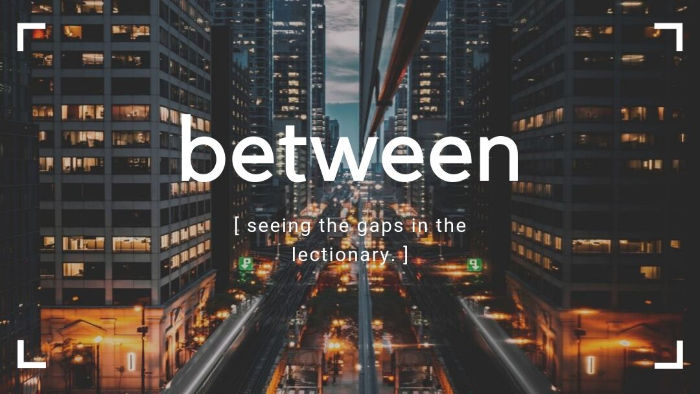A look at the gaps in the lectionary.
This week: the gap between Easter 6B and 7B
The text: John 15:18-17:5
After hearing about the vine and love, of connection and community, Jesus ends chapter 15 by talking about the world’s hatred. It necessarily contrasts with God’s love—the love shared with Jesus to share with humanity.
The turn feels stark and sudden. And it is paired with talk of going away. Of those who hate coming to get him.
The tone and purpose remains consistent, however.
Jesus talks, not about circumstances happening to them, but to the witness of the disciples—of following Jesus’s command to love—in a world that isn’t like that.
The focus throughout chapter 15 is about reminding the disciples of the work that they are to do. And while we are keenly aware of our own work as disciples, we remain a lot like the disciples then: far more focused on what is happening to them than on what they are doing in the name of Christ.
Shifting Focus
Most of our churches are full of good people trying to do the right thing. This is an amiable and good thing. I don’t think we’re doing it wrong.
But it is also fair to say that what the world sees in Christianity isn’t a people living unafraid, compelled and protected by the Holy Spirit, and living out a conviction to protect and enrich the powerless.
Today, the most prominent Christian voices in the United States are obsessed with protecting other Christians from any perceived slight or indignity, working for total and absolute liberty—at the expense of literally anyone else.
These same voices have inherited a political agenda to make evangelicalism to equal “Christian” in the common mind. So that when a baker brings a real case of a hypothetical situation of baking a cake, the Supreme Court would choose to allow it—ostensibly to protect a Christian from persecution.
This is literally the opposite of what Jesus teaches.
Jesus says to love in every situation. And that our job is follow Jesus’s command in every situation.
By abstracting it, we center the debate on whether we ought to protect Christians from persecution—rather than what Jesus actually says. Christians protect others from persecution—even in the midst of persecution themselves. They aren’t there to protect themselves.
The focus and orientation is all wrong.
Jesus wants us focused on the work we’re called to do: loving neighbor, forgiving debts, making justice, waging reconciliation. Not on safety, power, and preservation of our institutions.
Some Bad News
The turn at the end of chapter 15 and throughout chapter 16 serves a better preparation for Pentecost than the one we actually get from chapter 17.
Jesus introduces a promise of The Advocate who would come to guide them and inspire them for the work ahead.
This evocation of an Advocate comes amid Jesus’s speaking to his own departure from them. This grounds the notion of the disciples continuing the work in a post-Jesus-present-with-them world. That they will be persecuted like he will be. That they must persist in the work, not in preservation.
The shift of the tenor of the Good News to bad-sounding defeatism isn’t on Jesus, but on us. Jesus makes it clear that he is supposed to be a sacrifice. That it will be OK. But that our work of love is the important part.
That so many of us struggle with this now is far more demoralizing than our circumstances. And yet it is as predictable as it is disappointing. Because our fear of decline, of emptying pews and bank accounts, of cultural irrelevance—or the flip side: our desire for cultural hegemony, swelling pews and bank accounts—proves an unwillingness to listen.
The Holy Spirit is with us to guide us into truth. And this truth is one we’d rather avoid.
